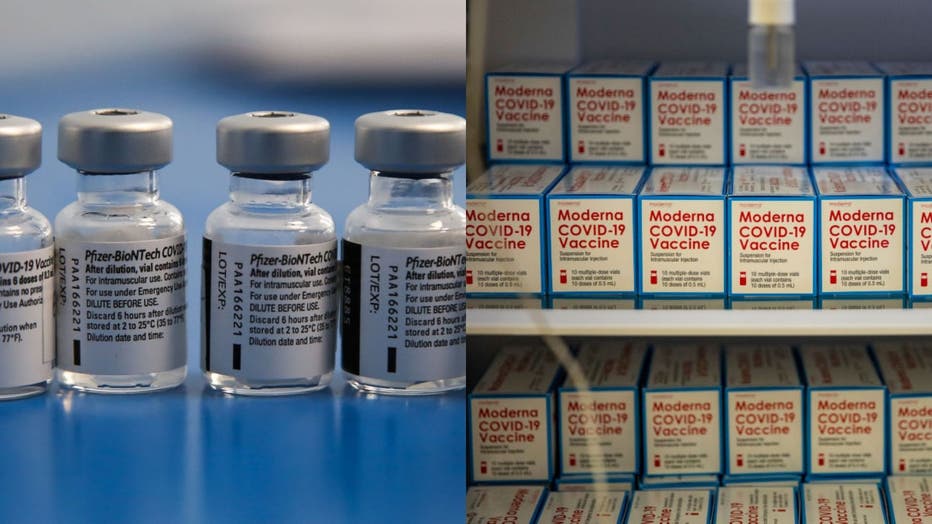Pfizer, Moderna: 1st COVID-19 vaccine recipients could need booster by September
Both the CEOs of Moderna and Pfizer said a booster dose of their respective COVID-19 vaccines could be required as soon as September for those who were among the earliest vaccinated.
During an Axios COVID-19 vaccine event on May 19, both the CEO of Moderna and the CEO of Pfizer said that depending on the research being done on the efficacy and longevity of the vaccines, a booster shot could be needed between either eight to 12 months after the recipient’s initial two-dose vaccine series.
But the decision is mostly dependent upon health officials at the U.S. Centers for Disease Control and Prevention and the Food and Drug Administration to approve booster shots, Pfizer told FOX TV Stations in an emailed statement.

FILE - Side-by-side image collage of Moderna COVID-19 vaccine boxes and Pfizer-BioNTech vials.
RELATED: Moderna vaccine booster appears to neutralize South Africa, Brazil COVID-19 variants
"Based on what we have learned so far, our current thinking is that a third dose, a boost of our vaccine, may be needed at some time in the future to extend protection against COVID-19, subject to approval by regulatory authorities," Pfizer said.
Earlier this month, Moderna’s president said consistently getting boosters every nine to 12 months to prevent severe illness from COVID-19 could be a possibility.
"That probably looks like boosting on a nine to 12 month after primary series as an annual booster for now, at least while we’re continuing to see the evolution of the virus," Dr. Stephen Hoge, president of Moderna, said during an earnings call on May 6.
RELATED: Pfizer CEO says third dose of vaccine 'likely' needed within 1 year
Hoge noted that Moderna does not believe the virus is going to follow one path of evolution, so the best way to ensure protection "against the broadest number of variants of concern is a multivalent vaccine." Moderna is still waiting to receive complete data, Hoge said.
Stéphane Bancel, the company’s chief executive officer, also discussed the importance of boosters during the call.
"New variants of concern continue to emergence around the world. And we believe that over the next six months as the southern hemisphere enters the fall and winter, we could see more variants of concern emerge," Bancel said. "We believe booster shots will be needed, as we believe that the virus is not going away."
RELATED: Biden says Pfizer's vaccine approval for kids 12-15 is ‘one more giant step’ in ending pandemic
Moderna and Pfizer are two of the three FDA-authorized vaccines being administered in the United States. They’re both two-dose mRNA vaccines, as opposed to the single-dose shot offered by Johnson & Johnson.
That means a Moderna or Pfizer booster shot would be a third injection for recipients.
Since the vaccines received emergency use authorization in the winter, more than 123 million Americans have been fully vaccinated, according to data collected by the CDC.
RELATED: Fauci says variants are ‘wild card’ in COVID-19 booster vaccine equation
COVID-19 case numbers have declined, but most importantly, hospitalization and death rates have rapidly fallen — preventing the health care system from becoming overwhelmed.
More than 157 million Americans have received at least one dose of a COVID-19 vaccine, and 123 million are fully vaccinated against the virus. President Joe Biden hopes the U.S. will have 160 million people fully vaccinated by July Fourth.
Globally, more than 3.3 million people are confirmed to have died from the coronavirus. The U.S. has seen the largest confirmed loss of life from COVID-19, at more than 586,000 people.
The Associated Press and Jordan Smith contributed to this report.

